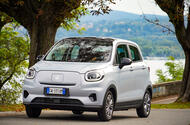Nascent Chinese electric car brand arrives in Europe with tiny electric city car
We’ve lost count of the number of Chinese brands that are coming to the UK, invariably planning to offer us the novelty of electric cars that look like they were styled by AI and named as imaginatively as your average photocopier.The Leapmotor T03 appears to perfectly fit the stereotype – except, it has one very important difference to its compatriots.You see, Leapmotors sold outside of China – starting with the T03 baby hatchback tested here and the big C10 family SUV – are actually sold by Leapmotor International, a joint venture owned 49:51 by the nascent Chinese company and Stellantis, the multinational giant that runs 14 brands from France, Italy, Germany, Britain and the US.The benefit of this, Leapmotor International CEO Tianshu Xin told us, is twofold: the brand can bypass the expensive set-up phase by simply adding its range to existing Stellantis showrooms across the nation; and potential customers will be reassured by familiarity and “360deg of support during the entire experience, from the selection of the vehicle to financing solutions and post-sales assistance services”. To say that Leapmotor – which began in Hangzhou a mere eight years ago by Zhu Jiangming, an electrical engineer with no prior automotive experience – is being ambitious about its growth abroad would be an understatement.It’s launching in Europe (including the UK), India, South-East Asia, Oceania and South America within the space of a year and expects to sell 250,000 cars this year – almost double its 2023 total – and 500,000 in 2030.It has defined its key brand values as affordability (it claims the T03 is the car that finally gives A- and B-segment buyers access to electric power, although the Dacia Spring will have something to say about that) and cutting-edge technology that takes the hassle out of your daily life.It certainly is one of the cheapest electric cars on sale at a mere £16k: that Leapmotor makes the majority of its parts in-house, hasn’t designed in superfluities and is harnessing Stellantis economies of scale apparently help the price, as does it being made on the old Fiat 500 line in Poland, not in China, and therefore avoiding both shipping costs and a 20% EU import tariff. View this post on Instagram A post shared by Autocar (@autocar_official)







